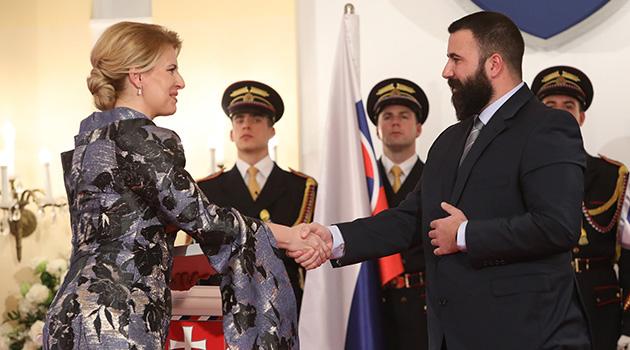Slovakia: Romani people protest against Fascists in the east

Supporters of the “People’s Party Our Slovakia” (ĽSNS) and those opposed to right-wing extremism encountered each other last week in Sabinov during an election rally. Approximately 350 Romani residents of the district arrived at the rally to express their disagreement with the party’s extremism.
Members of a coalition of parties not seated in Parliament, Progressive Slovakia and Together (PS&Spolu), also joined the protest gathering. Both the protest and rally proceeded without any incidents, although people from each side shouted at each other.
Marian Kotleba, chair of the ĽSNS, addressed the rally of about 200 supporters from the podium, as did party spokesperson Ondrej Ďurica, Slovak MP Ján Kecskés, and former Slovak MP Milan Mazurek. On the basis of a memorandum signed with other political parties, the chair of the Christian Democratic Alliance (KDŽP Aliance ze Slovenska), Tomáš Taraba, also gave a speech to the ĽSNS supporters.
Civic activist Ladislav Duda said protesters were there because “We disagree with Fascism in Slovakia… We don’t want Fascists either in the Government or in Slovakia as such.”
“They won 11 % of the vote in this town and that’s enough. We must express ourselves on this issue, we can’t just stand by and watch this,” the activist said, adding that people from Christian organizations active in the region were among the protesters.
While Duda did concede that some localities in Slovakia are problematic, he emphasized that it is not possible to make generalizations about Romani people and pointed out that the crime rate in Sabinov is low. Approximately 50 people supporting the PS&Spolu coalition also turned out to express their disagreement with the ĽSNS and its politics.
“We’ve come to show people that hate and populist speeches actually will change nothing,” PS&Spolu coalition leader Michal Truban said. “We all have the same problems, but it will be of no aid just to yell about them.”
“It’s necessary to have a civil, constructive debate and mainly, as I said, hate genuinely resolves nothing,” Truban said. According to Ďurica, rallies are a common component of the party’s election campaign.
“We are holding many meetings with the citizens and as far as protests go, or protesters, naturally we perceive this and we respect it,” he said. “Anybody has the right to express an opinion if it is done civilly and does not disrupt our properly announced and permitted rally.”
“We see that as part of democracy, of the political battle, so it’s in order,” Ďurica said, adding that in different towns they have encountered mostly small groups of protesters. The ĽSNS spokesperson also rejected the idea that the rally had been organized in Sabinov because Jewish people had been deported from there during WWII.
The Oscar-winning Czechoslovak film “The Shop on Main Street” (Obchod na korze) was made in Sabinov in 1965. “Last year, as part of our campaign, we held approximately 113 rallies,” the ĽSNS spokesperson said.
“This is not actually aimed at any specific location and it is not related to a specific date,” Ďurica said. Another protest against the ĽSNS was scheduled last week in Košice, called “Let’s Stand Up against Hate and Extremism”.
